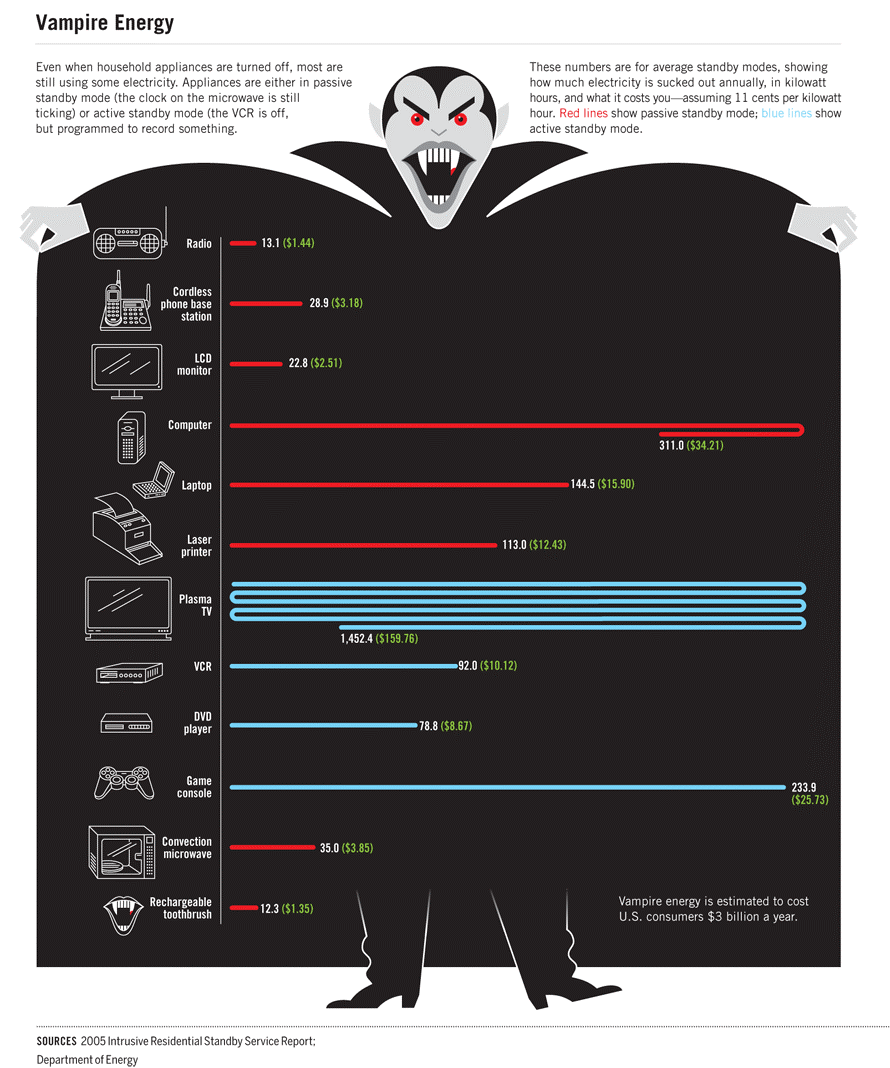 In the spirit of Halloween, I’ve dug up the worn down topic of Vampire energy. Vampire energy? Does that have something to do with people that wear you down and drain you from energy? No, that’s Energy Vampires. Vampire energy is another expression for wasted standby power, which sucks (hence the vampire metaphor) energy without you being aware of it and therefore takes a bite out of your wallet.
In the spirit of Halloween, I’ve dug up the worn down topic of Vampire energy. Vampire energy? Does that have something to do with people that wear you down and drain you from energy? No, that’s Energy Vampires. Vampire energy is another expression for wasted standby power, which sucks (hence the vampire metaphor) energy without you being aware of it and therefore takes a bite out of your wallet. We sit at our computers a lot, for work, for play, or anything in between. Consider this computer. A desktop computer comes with a monitor. You’ll probably have a modem and possibly a wireless router on top. Some might have an external storage device that needs it’s own energy supply. What about having another computer, or laptop, next to the first one. That’s a lot of devices in need of power. Even when you’re not using them actively, but just leave it switched on ‘so it won’t take so long’ when you have to consult the internet on any sudden occurrence of information necessity. And that’s just looking at computers. Appliances like microwaves, phone chargers, stereo installations and even toothbrush chargers also suck up energy while not being used for anything.
We sit at our computers a lot, for work, for play, or anything in between. Consider this computer. A desktop computer comes with a monitor. You’ll probably have a modem and possibly a wireless router on top. Some might have an external storage device that needs it’s own energy supply. What about having another computer, or laptop, next to the first one. That’s a lot of devices in need of power. Even when you’re not using them actively, but just leave it switched on ‘so it won’t take so long’ when you have to consult the internet on any sudden occurrence of information necessity. And that’s just looking at computers. Appliances like microwaves, phone chargers, stereo installations and even toothbrush chargers also suck up energy while not being used for anything.An often heard excuse is that turning the devices on and off all the time can not be good for the equipment, it wears it down. But such a thing has never been proven and is highly unlikely according to some, saying that the most harm it does is the impracticality of having to reset an internal clock again.
Much attention has been paid to the topic of energy consumption since the last two decades. This attention has resulted in standards like Energy Star and a growing awareness among consumers. But we’re not there yet. Having a computer with the Energy Star label, doesn’t automatically mean you save energy. You have to configure the right settings for the computers energy usage: if it’s not set to go into sleep mode or hibernation mode after a certain amount of time, it will keep on using excessive power.
Power strips are among the easier solutions. Switching off the power strip when non of the plugged-in devices are in active use, totally cuts them off from the energy net and prevents them from ‘vampiring’ energy.
(look at one of the names that comes up at the end!!)
But the problem starts elsewhere. As long as we don’t realize how much energy we waste, and how much this waste costs us, we’re not likely to alter our ways. We often consider our own energy consumption to be around average, or we don’t consider it at all. So, the solution should start at confronting people with it. The data should be visual, metaphorical for consumers to grasp it’s implications. Furthermore, the data should not concern an average household, it should concern our own household. The smart meter is a promising development here. There’s issues concerning privacy (we’re talking about monitoring and storing personal data) that have to be taken into account, but the very personal and inhouse application of the meter will construct a personal bond between the data and the person using the power.
There are two problems that immediately pop up. First, not surprisingly it turns out to be difficult to convince consumers to install a smart meter. This year the Dutch energy supplier Liander posted a request for concepts on the crowdsourcing website Battle of Concepts, on how to have people ‘lining up for the smart meter’. Secondly, when the data is collected, it still doesn’t mean much to consumers. It has to be transformed into something tangible, preferably through a metaphor relating to money, and it has to be made accessible: data transformation and interface.
Geen opmerkingen:
Een reactie posten